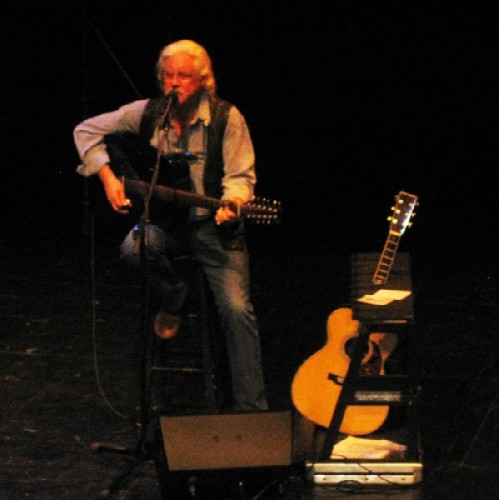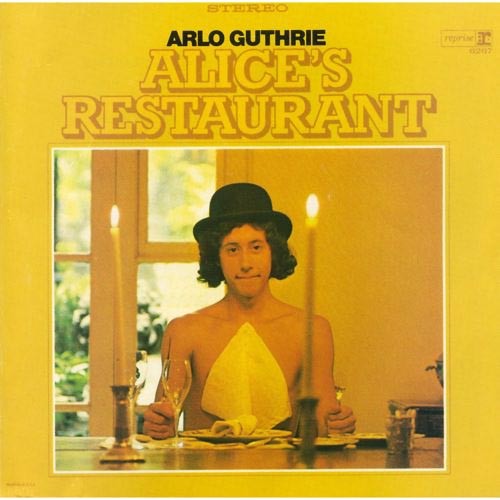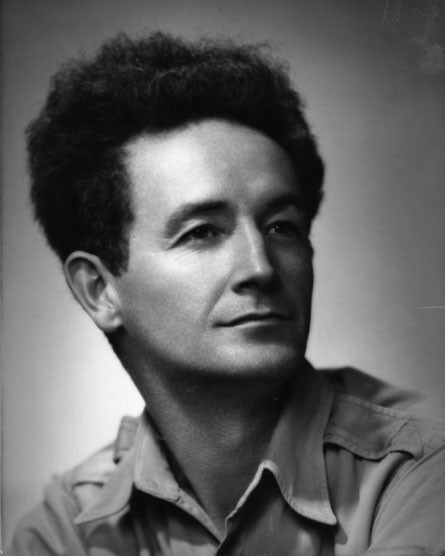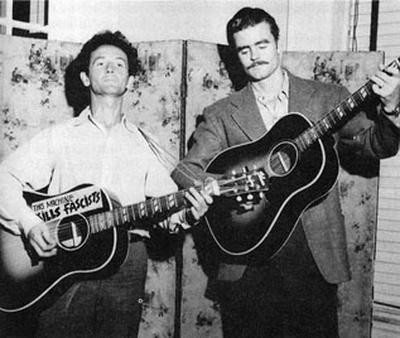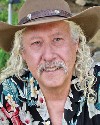Arlo Guthrie Performs at Shakespeare & Company
Benefit Galvanizes Berkshire Community
By: Charles Giuliano - Dec 06, 2009
It was sloppy driving to Lenox last night, during the first winter storm. That didn't seem to stop a near capacity audience in the Founder's Theatre of Shakespeare & Company. Come hell or high water we were there to support the embattled theatre company, a crown jewel, of the Berkshire's cultural community.Friend and neighbor, folk singer Arlo Guthrie, ambled on over from nearby Washington where he and his wife Jackie have raised three daughters and a passle of grandpups. He told us one of his scary bedtime stories about moose looking in on little kids at night, Arlo is not into those feel good stories. No his bedtime tales are designed to scare the willies out of toddlers who huddle under their blankets.
It was typical of the wit and charm of the legendary performer who, seated on a stool, regaled us with songs and stories for a full hour. The audience stamped and hollered for more bringing him back for a couple of encores.
The set included several songs by his father, Woody Guthrie (1912-1967). Including the last number of his impromptu program "This Land is My Land, This Land Is Your Land." The anthem was separated by an extended coda in the manner of hipster humorist, Lord Buckley, riffing on an ersatz retelling of the Biblical tale of Joseph and his coat of many colors. To say that he lost his place risks understatement. But he managed to bring it all back home.
In addition to the obligatory tribute to the spirit of Woody, the most prolific and greatest white folk singer of his generation, he added material by Woody's running buddy, Cisco Houston. There was also the galvanic "City of New Orleans" by Steve Goodman, a song by the blues duo, Sonny Terry and Brownie McGhee, and a Woody song that became a standard for Peter, Paul and Mary.
Arlo mixed in a couple of his own tunes but despite shouted requests during encores did not oblige with his signature eighteen minute, 1967, rap "Alice's Restaurant." That was a long time ago. Arlo conveyed that he had moved on from the sanguine youth of that epic protest song. It was fomented by a run in with officer Obie while trying to dump the trash after a Thanksgiving dinner in the Church served up by its then owners Ray and Alice Brock.
He reminded us that he went to school around here (Stockbridge School class of 1965) but said that he really didn't want to get into all that. Many of his school chums still live in the Berkshires.
Although Arlo is a college drop out he is hardly the rustic hick and folkie conveyed by his stage persona. It is in fact a page from the book of his father Woody. During the Dust Bowl years Woody rode the rails and hitchhiked criss crossing America. He developed a vernacular style of plain speak that appealed to his downtrodden audience.
Woody sang to and about migrant workers, Oakies, hobos, and commies. Often he teamed up with Pete Seeger, Cisco Houston, the Weavers and others committed to social and political change. His most important song "This Land Is Your Land" was written as a pointed response to Kate Smith's hit at the time "God Bless America." He advocated that the people take possession of their country. It belongs to all of us. This was an era when farmers lost their homes during the Dust Bowl and people lined up for bread and soup during the Great Depression.
Evoking that time of economic crisis, which is so much like what is going on today, Arlo performed his father's 80 year old tribute to the bank robber and indigenous Robin Hood, Pretty Boy Floyd. He was always welcome to supper while on the lam from the Feds. The criminal often left a crisp stack of cash under the plate to pay off a mortgage and save a farm. There was the telling lyric about how you can be robbed by a gun or a fountain pen. And that a bank robber never took your farm.
The set jingle jangled and ambled along. Arlo referred to that informality with wonderful humor. He described how he used to plan out a set and tape the song list to his guitar. But when he reached 50 (born in 1947) he couldn't read it anymore. The audience cracked up at that revelation. There was also some fumbling about with harmonicas and endless tuning between songs. Revealing his ineptness and gonzo stage manner at one point he captured our hearts by exclaiming that thank heavens it was "only a benefit."
But give him credit he kept our attention all by himself. He quipped that anyone can do this if they know the songs and what they are doing. Which, of course, was not the case last night as he stutter stepped and stumbled about.. Messin up was part of the fun. Slick is just not a part of his act.
Often when launching into a poignant protest song from back in the day, when it was OK and righteous to be a commie, he noted how like today the lyrics seemed. Punctuating the irony he stated it was less that the songs had staying power than that "The world still sucks." Indeed it does.
But kids nowadays ain't much interested in folk music and protest songs. That ended when Woody's greatest protégée, Bob Dylan, went electric. Initially he was booed for it during a legendary performance at the Newport Folk Festival.
During an excursion into discussing how to write songs Arlo described it as like fishing. You sit by the stream and watch the ideas drift by. Now and then you hook one. Or they swim by and someone else nabs them "Like Bob Dylan." He advised that if you want to be a successful song writer don't sit by the river down stream from Dylan.
When Arlo was born he was the last of eight children fathered by Woody and three wives. During the first two marriages he was rarely at home as he rambled about singing for his supper. In addition to composing hundreds of songs he wrote letters, kept diaries, and wrote fiction. His famous "Bound for Glory" stretches the truth but is a compelling read.
During his last years Woody was ravaged by Huntington's Disease which he inherited from his mother. Arlo grew up surrounded by his dad and folk musicians. But he also knew the terrible suffering of his father. He spoke of this rather lightly. He invited the audience to join him for the chorus of one of his dad's last songs "My peace is all I got and I can give it to you." It was a powerful and gut wrenching moment.
There was an odd pendulum as Arlo swung back and forth through the set evoking many moods and colors. At times we saw the humorous entertainer; the world weary troubadour out on a stormy night to perform a benefit. The self deprecating humor was also a way of keeping a distance from the audience and masking the real pain of life experience and loss. He seemed flummoxed at the wonder of his own seniority now sliding into the role of elder statesman.
Now and then we caught glimpses into that darker side including a stunning version of the Cisco Houston standard "Saint James Infirmary." It is usually performed as a rave up and howling blues. But Arlo worked it with gutsy intimacy. We were there in the morgue and traveled with him to the grave. He let us glimpse deeply into his soul.
This occurred again in a long rap leading up to "City of New Orleans." It started with his telling us about how Steve Goodman in the wee hours of the morning, after a weary night of performing, prevailed on Arlo to listen to his song. Goodman bribed him with a beer. That morphed into a ramble about a tour to raise money for Katrina relief. How there was an ill timed, poorly organized train ride from Chicago to New Orleans. It entailed interviews which he hates and dealing with lots of other people and performers. They whistle stopped along the way staging benefit concerts. It was all kind of a mess.
Until boarding the train with his wife and daughters while departing from Chicago there was an insightful moment. His daughter said "Dad do you know we are sitting on the City of New Orleans." That revelation informed his playing of the
song, charging it with passion and special meaning.
Yeah it was a benefit. Hey thanks Arlo for helping out.in yet another good cause. But we could have used a few more songs. Short and sweet but you left us hungry. Guess we'll just have to wait till summer when you have that Tanglewood gig with the Pops. That should be great.
But nothing will ever top being so up close and personal during a dark and windy night in Lenox. Sweet.

